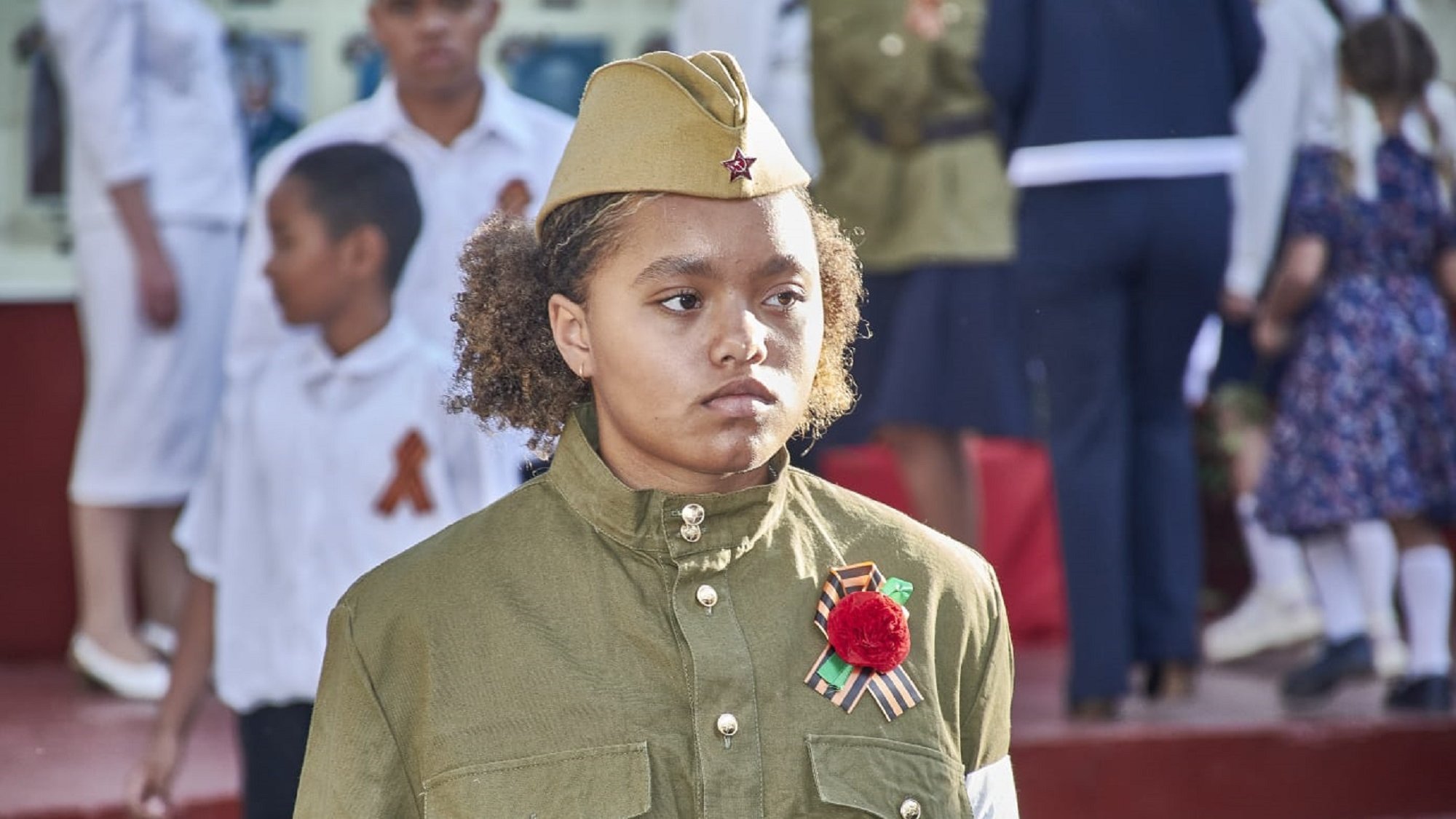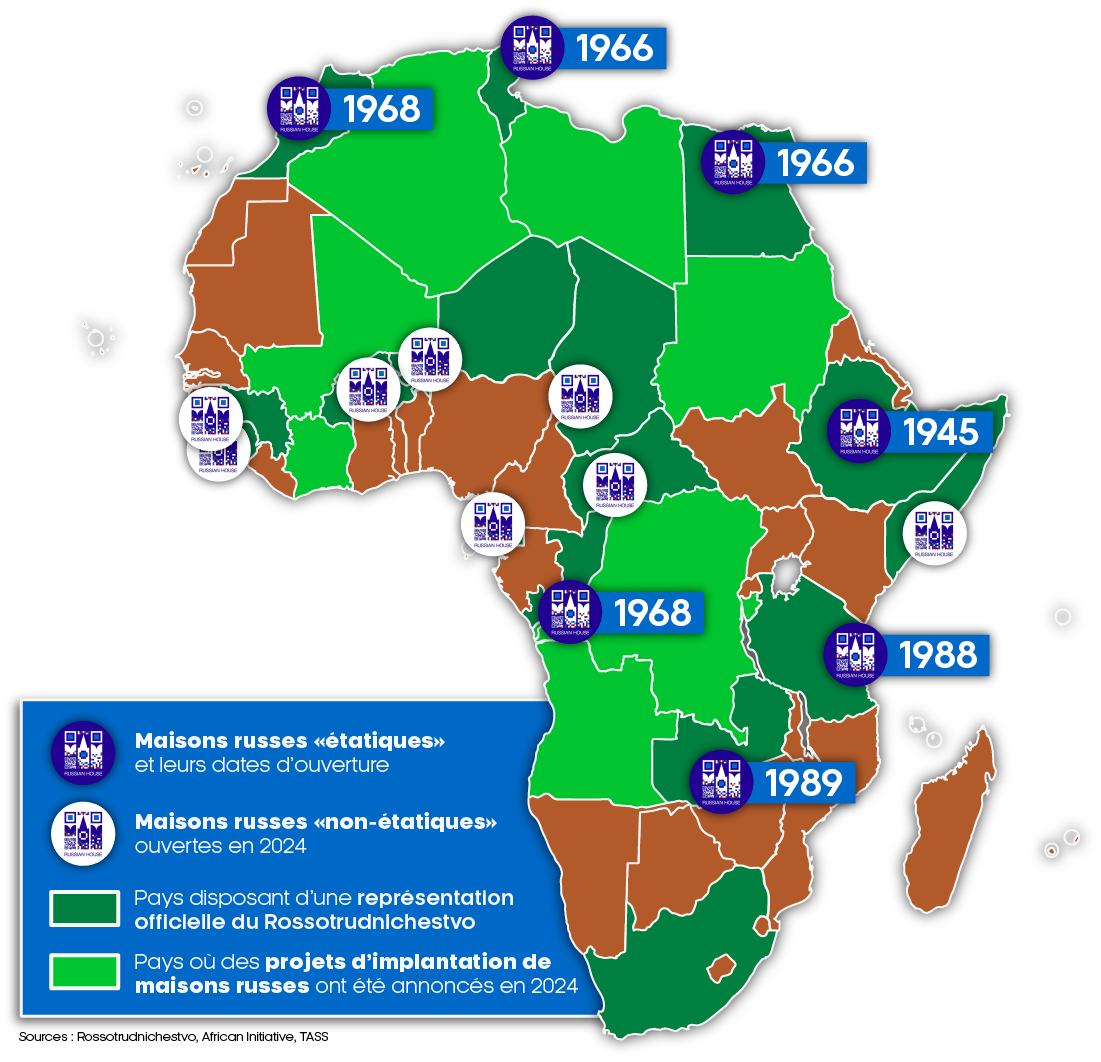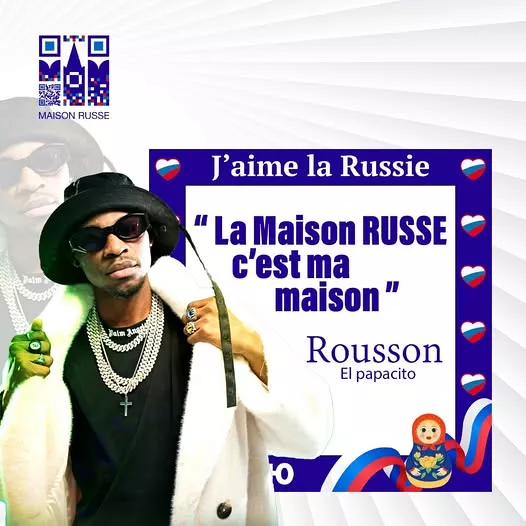
“You know, I’m from Siberia, and being able to participate in a theatre festival in Africa means a lot to me,” says Igor Lesov with a big smile, as the audience at the Maison du Théâtre du Bardo in Tunis applauds. In front of around a hundred spectators, the actor has just performed The Tale of Count Nulin, a play by Russian playwright Alexander Pushkin, in Russian, alongside three other artists from the Moscow School of Dramatic Art.
The performance took place at the end of November during the Carthage Theater Days 2024, an annual theatre festival. “The room was much fuller than at previous sessions,” assures the ticket clerk at the entrance. After the show, the Russia Today (RT) news channel interviewed audience members, split between Russian expatriates and Tunisian theatre enthusiasts. “I’ve already learned some Russian on my own, and I was curious to see Pushkin’s work,” says Mohamed as he leaves the theatre. The young literature student adds, “Russia has a huge literary heritage that we don’t know much about in Tunisia.”
“Broadening Tunisians’ understanding of Russian culture” is the stated goal of Yuri Zaitsev, director of the Russian House in Tunis, who was thanked by the troupe for supporting the event. The following month, the institution helped organise two more theatre performances in the country, along with a Christmas concert, an excursion to the Cap Bon region, and an information session on studying in Russia. In addition, three weekly language courses are offered at the Russian House premises in Tunis.
From the Soviet legacy to the Sochi summit
In reality, the “Russian House in Tunis” has only been called that since 2021. Before then, the institution was known as the “Russian Centre for Science and Culture” (RCSC). Founded in 1966, it was part of the USSR’s cultural diplomacy framework. In 2008, the Russian government established Rossotrudnichestvo, an agency responsible for humanitarian cooperation and managing RCSCs worldwide. “Russian Houses are thus decentralised cultural diplomacy organisations linked to Rossotrudnichestvo,” explains Maxime Audinet, a researcher at IRSEM and specialist on Russia, noting that it is “a fairly classic setup, akin to the French Institutes.”
Rossotrudnichestvo inherited seven African centres, founded between 1945 and 1989 across the continent: Addis Ababa (Ethiopia), Cairo (Egypt), Rabat (Morocco), Brazzaville (Republic of Congo), Dar es Salaam (Tanzania), Lusaka (Zambia), and Tunis. “For a long time, Africa was the blind spot of Russian cultural diplomacy,” says Maxime Audinet. According to him, the “turning point” for the Kremlin’s re-engagement with the region was the 2019 Sochi Summit: “People often talk about Wagner, R.T., and Sputnik, but since that summit, there’s also been a push to reinvest in Africa through public diplomacy.”
Two years later, African RCSCs were rebranded as Russian Houses, adopting a logo that features a “state architectural attribute” referencing the Kremlin in Moscow, according to Rossotrudnichestvo, as well as a QR code linking to the agency’s website. Officially, the missions of Russian Houses remain unchanged: promoting the Russian language and culture and managing scholarships and study programs.
“We’re responding to the aspirations of our friends”
However, starting in the early 2020s, most African Russian Houses intensified their social media presence, ramping up official communication and increasing event frequency. This revitalisation was driven by new directors: Yuri Zaitsev, who arrived in Tunis in 2022, is a former official from the Ministry of Culture and a museum director in Moscow. In Ethiopia, Alexander Evstigneev, a journalist for state television, took over the centre in late 2023. In Brazzaville, Maria Fakhrutdinova, a graduate of the Moscow State Institute of International Relations and a native of Sevastopol (Crimea), has been the director since 2021.
In addition to these centres, Rossotrudnichestvo is working to open more Russian Houses in Africa, following a “non-governmental” model. This term, used by Rossotrudnichestvo director Yevgeny Primakov in a January 2024 interview with TASS, actually refers to partnerships with existing structures in host countries. On September 16, 2024, five agreements were signed for “non-state Russian Houses” in Sierra Leone, Equatorial Guinea, the Central African Republic, Somalia, and Chad. At the signing ceremony, Yevgeny Primakov stated:
The demand from local communities for Russian education, language, and cultural ties far exceed the current official network of houses. That’s why we’re responding to the aspirations of our many friends around the world. Russia is by no means isolated.
An expanding network
“It’s much simpler to set up these kinds of structures with a reduced budget,” notes Maxime Audinet, adding that the “non-governmental,” model also provides, “a pillar for engaging with civil society.” This is significant given the diversity of Russian actors in these countries. In Bangui, for example, the new Russian House is directed by Dmitry Sytyi, a key figure in Wagner’s expansion in the country during Yevgeny Prigozhin’s time. Conversely, in N’Djamena, a group of Chadian students initiated the Russian House project.
Rossotrudnichestvo has not disclosed the total number of Russian House openings completed or planned in Africa. However, media statements from the agency in Kremlin-aligned outlets indicate eight partnership agreements with “non-state” entities in 2024, alongside seven officially announced plans for new Russian Houses. These expansions are also supervised by Rossotrudnichestvo representatives. In Tunis, Yuri Zaitsev confirmed that the Russian House has been tasked with “developing cultural cooperation” in Libya and Algeria.

Beyond the official network, some existing associations in other countries are strong candidates for potential expansions, as they already offer similar activities to Russian Houses. For example, the Russian Cultural Center in Yaoundé is “working towards recognition by Rossotrudnichestvo,” according to its director, Olga Efa Fouda. An expatriate in Cameroon since the 1980s, she says the centre is already sponsored by the Russian Embassy and aims to “spread the Russian language and culture and make our history better known in Africa.”
Russian history, art and narrative
On May 9, 2024, the Yaoundé Russian Cultural Center organised a “meeting at a private high school to commemorate Victory Day”, says Olga Efa Fouda. Most Russian Houses in Africa celebrate this date, which the USSR recognised as the day of victory over Nazi Germany in 1945. In October 2024, the Russian House in Tunis commemorated the centenary of the “White Army fleet’s dissolution” in Bizerte, marking the fall of the Empire. “In Russia, the role of history is characterised by a form of revisionism and selective memory,” recalls Maxime Audinet. In the case of the Second World War, the researcher explains, for instance, that “memory is used to glorify the role of the Red Army, while omitting several issues, such as the Molotov-Ribbentrop Pact”.
Russian Houses in Africa also host numerous events celebrating Russian art. From Tchaikovsky concerts in Rabat to military drama screenings in Pretoria and ballet performances in Cairo, “The focus is mainly on classic Russian culture,” notes Maxime Audinet, contrasting this with the French Institutes or Goethe-Instituts, which highlight contemporary and dissident works. Alexander Pushkin’s figure, for example, is ubiquitous, with his likeness appearing on several event logos. The African Russian Houses even use the artist’s face on several logos for events they organise.
“Culture is another battlefield for Russia,” says Olena Snigyr, an international relations researcher at the Robert Schuman European Center. “In the works of authors like Pushkin or Dostoevsky, one finds elements legitimising colonialism,” she notes. “The same could be said of French or English writers, such as Camus,” notes the researcher, “but they are now revisited with a critical approach, something to which Russian literature is completely immune.”
Vladimir Putin’s popularity
“With the Russian Houses, the focus is less on propaganda or disinformation and more on interpretations and narratives,” concludes Olena Snigyr. From this perspective, it is clear that the Russian Houses also serves as a tool for disseminating Kremlin ideology. For example, by showcasing copies of the book “25 Questions About Crimea” at the Tunis Book Fair in April 2024. The book provides various arguments justifying the 2014 military intervention. Similarly, by organising an exhibition in Rabat featuring testimonies from residents of the Ukrainian oblasts officially annexed by Russia in 2022.
On some social networks, the various pages of African Russian Houses have accumulated thousands or even tens of thousands of followers. In the media, the heads of the Russian Houses all describe a general enthusiasm from the public. “Our language courses are attracting more and more Cameroonians who want to study in Russia,” says Olga Efa Fouda. The Yaoundé Center, while remaining independent of Rossotrudnichestvo, offers official document translation services. Its director attributes the success of Russian universities to “the significantly lower cost compared to the West and the quality of education”, as well as “the popularity of President Putin, who stands up to France, the United States, and fights against LGBT issues”.

Nearly 34,000 Africans are studying in Russia for the 2024-2025 academic year, according to Russian authorities. While the country has become an attractive destination, it still lags behind the United States, which hosted 57,000 African students in 2022-2023, and especially the EU, which welcomed 282,000 African students during the same period. Through these alumni, Rossotrudnichestvo can also highlight the success stories of the most inspiring scholarship recipients. “I have incredible memories; Russia welcomed me and gave me excellent training,” says Rousson El Papacito, a young Congolese rapper who graduated in petroleum engineering from Perm University in the Urals. Rousson benefited from the Russo-Congolese cooperation scholarship and continues to receive support from Russian authorities. “I am deeply grateful to the director of the Russian House for her support,” adds the rapper, who performed a concert at the Russian Cultural Center in Brazzaville on August 17, 2024.
“Promote the positive ideas of the ‘Russian world.’”
“African audiences are enthusiastic about the Russian narrative,” says Olena Snigyr, who points out that the spread of Russian culture, history and language ‘serves to fuel favorable public opinion’. In addition to the anti-Western rhetoric already disseminated by the Kremlin media, the Russian Houses above all reinforce “the image of a great Russia, defending traditional culture and values, those of the russkiy mir”. In the post-Soviet space, the concept of “russkiy mir” (Russian world) refers to the ideology mobilized since the early 2000s by Vladimir Putin to delimit Russia’s sphere of influence, in which Moscow has every right to intervene.
In a November 2023 interview with La Vie internationale (the journal of the Russian Ministry of Foreign Affairs), Yuri Gerasimov, director of the Rossotrudnichestvo branch in Pretoria, explains:
As part of their relentless negative propaganda, Western media deliberately demonise Russia’s image, seeking to strip us of our great culture and history. One of the primary missions of Rossotrudnichestvo and our representations abroad is therefore to create an objective image of Russia and promote the positive ideas of the “Russian world.”
“The ’Russian world’ is a deliberately vague notion,” explains Maxime Audinet. “Some perceive it through an ethnocentric lens, while other actors promote a broader definition, including, for example, Russia’s sympathisers.” While Olena Snigyr acknowledges that it is “too early to speak of an extension of the russkiy mir to Africa”, the activities of the Russian undoubtedly Houses help forge deep and lasting ties with the African public. “This reflects a clear intent to project genuine soft power, aiming for a long-term presence in Africa,” summarises Maxime Audinet.
If you believe in the importance of open and independent journalism:

